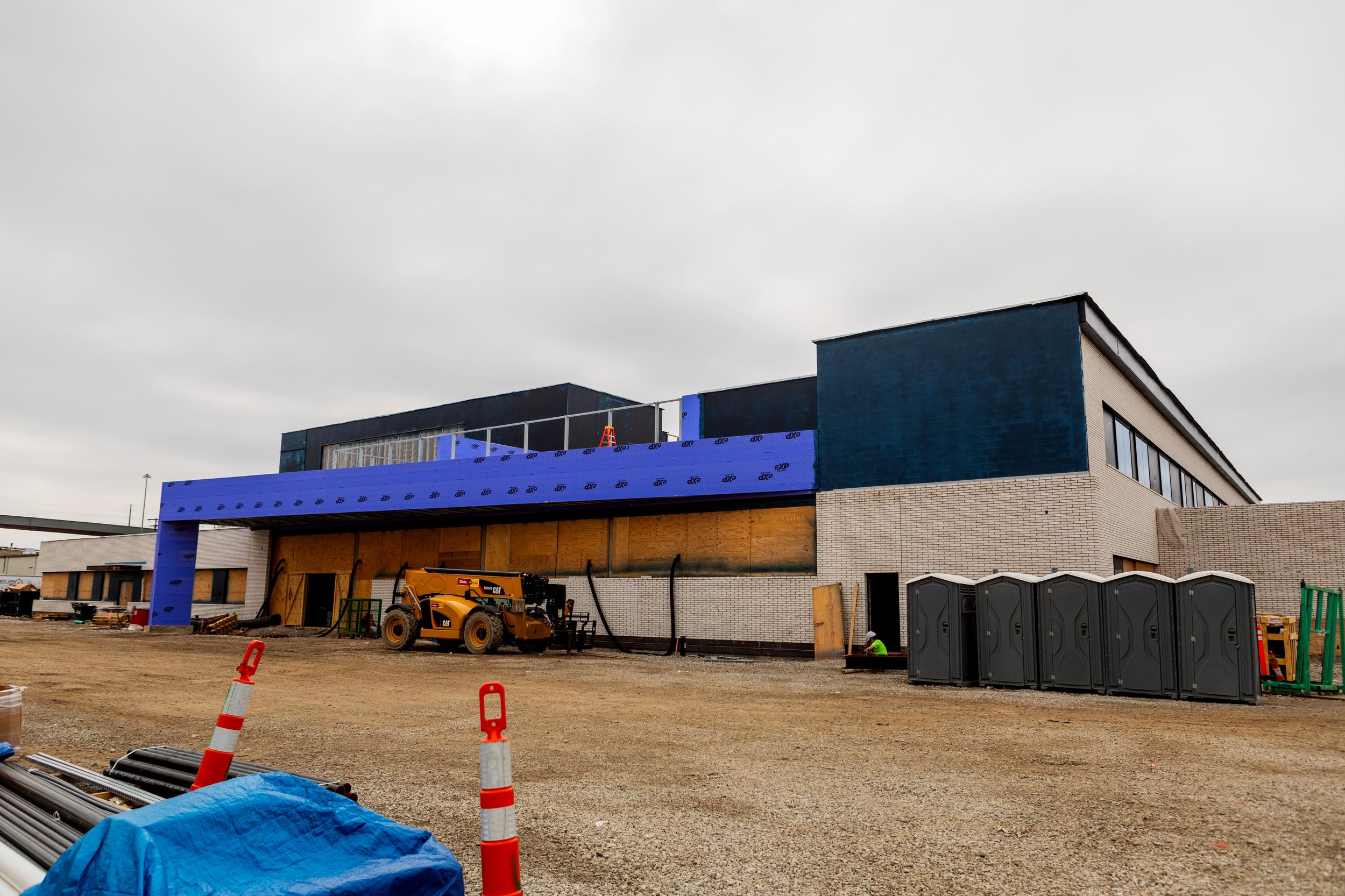Transformative change begins in all sorts of ways— sometimes, it’s inspired by a phone call. That’s what happened in 2008 when the late Nancy Jeffrey, a longtime friend of The Columbus Foundation and its former Governing Committee Vice Chairperson, called Columbus Foundation President and CEO Doug Kridler. Jeffrey, a dedicated advocate for community-based mental health services, expressed her concern over the community’s growing need for inpatient psychiatric care and urged The Columbus Foundation to get involved.

PICTURED: Erika Clark Jones, CEO of the Alcohol, Drug and Mental Health Board of Franklin County (ADAMH), outside the new Crisis Care Center.
At the time, hospital emergency departments throughout Franklin County struggled to find open beds for people in need of psychiatric crisis care, leading to overcrowded emergency departments and long wait times for patients. Soon after Jeffrey’s phone call, The Columbus Foundation convened a group to examine the issue and develop ideas to improve the delivery of care for patients experiencing a mental health crisis.
Together, the group of stakeholders—which included representatives from Franklin County’s adult hospital systems, mental health specialists, and other regional partners—came up with an innovative electronic bed board system to track open beds for psychiatric care in the area, as well as patients waiting for inpatient mental health care. With this system, hospitals could easily access real-time availability, helping patients connect with the appropriate inpatient care far more quickly.
With a plan in place, The Columbus Foundation awarded a grant to the Central Ohio Hospital Council to support the construction of the electronic bed board system. The Council, which played a key role in the conversations that inspired the bed board initiative, brings local hospitals together to improve the quality, value, equity, and accessibility of healthcare in the region.
In 2009, the electronic bed board system went live. According to Jeff Klingler, President and CEO of the Central Ohio Hospital Council, the impact was practically immediate. Within the first month, more than 400 patients were on the bed board, helping hospitals to more efficiently assist these individuals. By 2018, the bed board listed roughly 1,500 patients a month.
As Klingler explained, the electronic bed board system has provided value to the community. Moreover, it exposed a critical need for a continuum of mental health care and addiction services in Franklin County. “Through the electronic bed board, we now had the data to show an escalating mental health crisis,” said Klingler. “We realized we needed to go more upstream and identify ways to assist these patients before they’re in crisis.”
“I could not be more grateful for the generosity of our community."
ERIKA CLARK JONES, CEO of the Alcohol, Drug and Mental Health Board of Franklin County
Informed by the data, The Columbus Foundation once again brought together key stakeholders to strategize ways to improve psychiatric emergency services in Franklin County, which led to the formation of the Psychiatric Crisis and Emergency System (PCES) Task Force. Similar to the community partners that worked together on the electronic bed board initiative, the PCES Task Force included representatives from local hospital systems, mental health organizations, first responders, individuals affected by mental health and addiction, and others. Funded by The Columbus Foundation and the Alcohol, Drug and Mental Health Board of Franklin County (ADAMH), the PCES Task Force convened for regular meetings at the Foundation. Additionally, The Columbus Foundation partnered with ADAMH and the Central Ohio Hospital Council to invest in a professional facilitator to help keep the conversations progressing.
“This was a revolutionary approach to addressing a community-wide challenge, started by a phone call I received from the extraordinary civic steward Nancy Jeffrey,” explained Doug Kridler, President and CEO of The Columbus Foundation. “Although the challenges were many and complex, community partners came to the table and worked together to create a better way forward. The Columbus Foundation is proud to have played a convening role in these discussions and to invest in the development of an improved system of care.”
Over the course of several months, the PCES Task Force studied best practices from other areas of the country, examined the existing psychiatric emergency services system in Franklin County, and developed potential solutions to improve the system. After careful consideration and collaboration, the PCES Task Force put forth a series of recommendations. The number one recommendation: create a comprehensive, collaborative system of crisis care for individuals experiencing mental health and/or addiction emergencies.
This recommendation will soon become a reality with the Franklin County Crisis Care Center—a new, state-of-the-art facility currently under construction on Harmon Avenue in Columbus’ Franklinton neighborhood. Supported by public and private investment, the Crisis Care Center will offer an impactful approach to crisis care, integrating recovery, clinical, and medical services to provide comprehensive person-centered care in a welcoming, home-like environment.

PICTURED: Ongoing construction at the Crisis Care Center.
As Erika Clark Jones, CEO of ADAMH, shared, the Crisis Care Center is committed to a “no-wrong-door” approach, ensuring that all adults who arrive at the center receive services.
“Our role is very clear. We want to be able to meet everyone’s needs in the moment, connect them to ongoing care, and support them through recovery,” explained Clark Jones. “Regardless of one’s background, income, or race, any adult in Franklin County will be able to access these services and get on a path to wellness and recovery.”
When the Crisis Care Center opens in 2025, the 72,000 square foot facility will serve adults ages 18 and older and offer 24/7 walk-in care, family support services, mental health and substance use disorder treatment, pharmacy and medical services, extended stabilization and inpatient care, and more. Additionally, in partnership with community-based organizations, the Crisis Care Center will link patients to other crucial resources on-site, such as connection to available housing, to support individuals in their recovery after they are discharged.
“One in five people in central Ohio struggles with a mental illness or addiction. This is an issue that touches everyone,” said Clark Jones. “The Crisis Care Center will be a space where folks can access services that not only address an acute need, but also help them connect to better long-term care and health in the future.”
In 2022, to support its efforts to raise capital for the new $60 million center, ADAMH established the Crisis Care Campaign Fund, an Organization Endowment Fund at The Columbus Foundation. Thanks to the generosity of community members, Columbus Foundation donors, and others, the fund has raised more than $7 million, including a remarkable $2 million gift from the Tad and Nancy Jeffrey Fund of The Columbus Foundation. The Jeffreys’ incredible gift is a fitting tribute to Mrs. Jeffrey’s enduring legacy and tireless advocacy for mental health services in the region.

Your gift to the Franklin County Crisis Care Center helps ensure that individuals experiencing mental illness and addiction and their families have the resources and treatment needed to live more stable, healthy lives. Tribute gifts to the Franklin County Crisis Care Center honoring loved ones will be recognized in a meaningful way in the discharge lobby.
LEARN MORE
Reflecting on the journey that led to the development of the Crisis Care Center, Clark Jones and Klingler credit the spirit of collaboration among stakeholders for achieving this milestone. Importantly, the support of public and private funders—among them, the adult-serving hospital systems in Franklin County, which contributed $8 million to the effort—also played an essential role.
“This is probably the highlight of my professional career,” said Klingler. “I think that this should be a model for solving all of our community problems. I can’t wait to see other communities come here and say, ‘You really want to see how it’s done? Go to Franklin County.’”
“This was a collaborative, community-wide effort to develop a community-wide solution that is available to everyone,” said Clark Jones. “I could not be more grateful for the generosity of our community.”